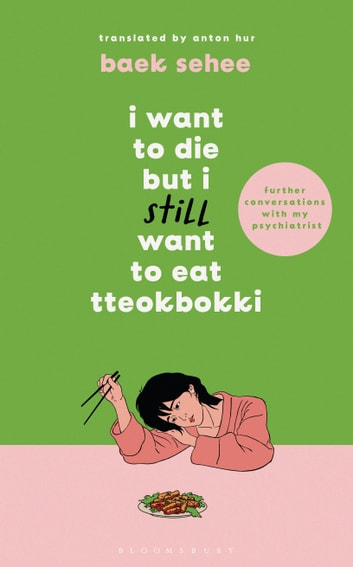
I Want to Die but I Still Want to Eat Tteokbokki: Further Conversations With My Psychiatrist
Baek Se-hee, Anton Hur
Publisher
Bloomsbury Publishing
Publication Date
6/6/2024
ISBN
9781526663672
Pages
222
Categories
About the Author

Baek Se-hee
Questions & Answers
Baek Sehee's therapy sessions illustrate how the therapeutic process contributes to self-discovery and healing through several key aspects. Firstly, it provides a safe space for Sehee to confront and explore her inner wounds, such as past rejections and body image issues, leading to self-awareness and understanding. Secondly, the therapist encourages Sehee to express her thoughts and feelings, allowing her to rationalize and distance herself from negative emotions. This process helps her to recognize patterns in her behavior and thought processes, fostering change. Additionally, the therapist's guidance in distinguishing between self and others' perspectives aids Sehee in developing healthier relationships and reducing self-criticism. Lastly, the therapist's focus on self-acceptance and appreciation of her positive qualities supports Sehee's journey towards healing and self-empowerment.
The book challenges societal norms and expectations regarding mental health and self-worth in several ways. It highlights the personal struggles with depression and anxiety, breaking the stigma surrounding mental health by sharing candidly about self-harming behavior, disordered eating, and suicidal thoughts. Baek Sehee's narrative also challenges the idea of self-worth being solely tied to external validation, as she reflects on her own experiences with body image issues and societal pressures. The book emphasizes the importance of self-acceptance and self-compassion, encouraging readers to embrace their flaws and understand that progress in mental health is a gradual process. Furthermore, it encourages readers to view mental health challenges as part of life, rather than something to be feared or ashamed of, fostering a more open and understanding perspective on mental health.
Baek Sehee's narrative in "I Want to Die but I Want to Eat Tteokbokki" contributes significantly to a broader understanding of the human condition by offering a raw and intimate look into the complexities of mental health, particularly depression and anxiety. Her candid exploration of her own experiences, including self-harm, disordered eating, and suicidal ideation, humanizes these struggles and highlights the vulnerability that underlies them. By sharing her therapy sessions, Sehee reveals the gradual process of healing and self-awareness, demonstrating that suffering is not isolated but a shared human experience. Her narrative also underscores the importance of self-compassion, challenging societal stigmas surrounding mental health and encouraging readers to embrace vulnerability as a part of the human journey. Through her transparency, Sehee fosters empathy and understanding, emphasizing the need for support and community in the face of adversity.
Baek Sehee employs several strategies to cultivate emotional resilience and self-compassion. She engages in therapy to explore and understand her emotions and experiences, which helps her gain self-awareness and develop a rational perspective. She practices self-compassion by acknowledging her feelings and not being overly critical of herself. She also utilizes techniques like journaling and conversing with herself to process emotions and gain clarity. Additionally, she focuses on self-care, including exercise, a healthy diet, and spending time with loved ones, which contributes to her overall well-being. Sehee also seeks external validation through her writing and connects with others who share similar experiences, fostering a sense of community and understanding.
The book "I Want to Die but I Want to Eat Tteokbokki" encourages readers to embrace their vulnerabilities by sharing the author's own journey through therapy and self-discovery. Baek Sehee's candid and honest accounts of her struggles with depression, anxiety, and self-harm demonstrate the power of facing one's innermost fears and emotions. The book emphasizes the importance of self-acceptance, suggesting that acknowledging and understanding one's past can lead to healing. It also highlights the value of seeking professional help and building a support system. By sharing her experiences, Baek inspires readers to explore their own vulnerabilities, seek healing, and find strength in their own unique journeys.